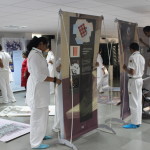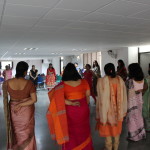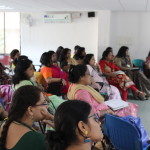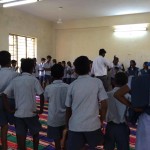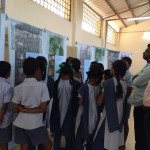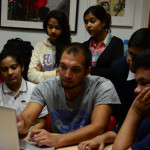Anne Frank—A History for Today, is a project that consists of an international travelling exhibition and related workshops and activities and is a part of the educational activities run by the Anne Frank House, The Netherlands.
The project first came to India in 2012 and was hosted at the Seagull Gallery. Soon after, in 2013, PeaceWorks became the India partner of the Anne Frank House.
Since 2013, the exhibition has travelled to 15 cities in India—Calcutta, Chennai, Pondicherry, Pune, Patna, Coimbatore, New Delhi, Mumbai, Ludhiana, Nashik, Chandigarh, Hyderabad, Manipur, Ahmedabad and Bangalore—reaching to over 23,000 students. 2018, we worked with the Anne Frank project in Bangladesh!
The Anne Frank – A History for Today project consists of:
- An exhibition that tells the story of Anne Frank against the background of the Holocaust and the Second World War. The exhibition shows visitors that cultural, ethnic, religious and political differences between people exist in every society and how these can lead to discrimination, exclusion, persecution and even murder.
It challenges visitors to think about concepts of tolerance, mutual respect, human rights and democracy and emphasizes on the importance of ‘Learning to Live with Difference’.
- Peer Guide Training workshop. The Anne Frank exhibition is primarily aimed at young people from 11 to 18 years old. In many countries young people act as guides to the exhibition. They are prepared for this task with special training, where they learn about the background to the exhibition, but also how they can communicate its content to people of their own age and how they can introduce more general themes such as tolerance and discrimination.
- Human Rights Defenders Programme – Teacher Training. As part of the Anne Frank project in India, PeaceWorks has developed a human rights education module based on the Anne Frank story and the Holocaust. Aimed at students of class 9 – 12 the module inspires students to become human rights defenders within their communities.
- Free2Choose Create. A three-day workshop where young people make their own film clips on the dilemmas that arise within their communities. Under the guidance of professional educators, they write their own scripts, conduct research and interview people on the street. The films serve as a point of departure for a debate on Human Rights.
- Memory Walk. An innovative educational film workshop that encourages youth to critically reflect on memorials and concepts of commemoration in their living environment. Young participants are trained to conduct research on monuments and explore the relevance of the monuments for themselves and their community in present-day society.

